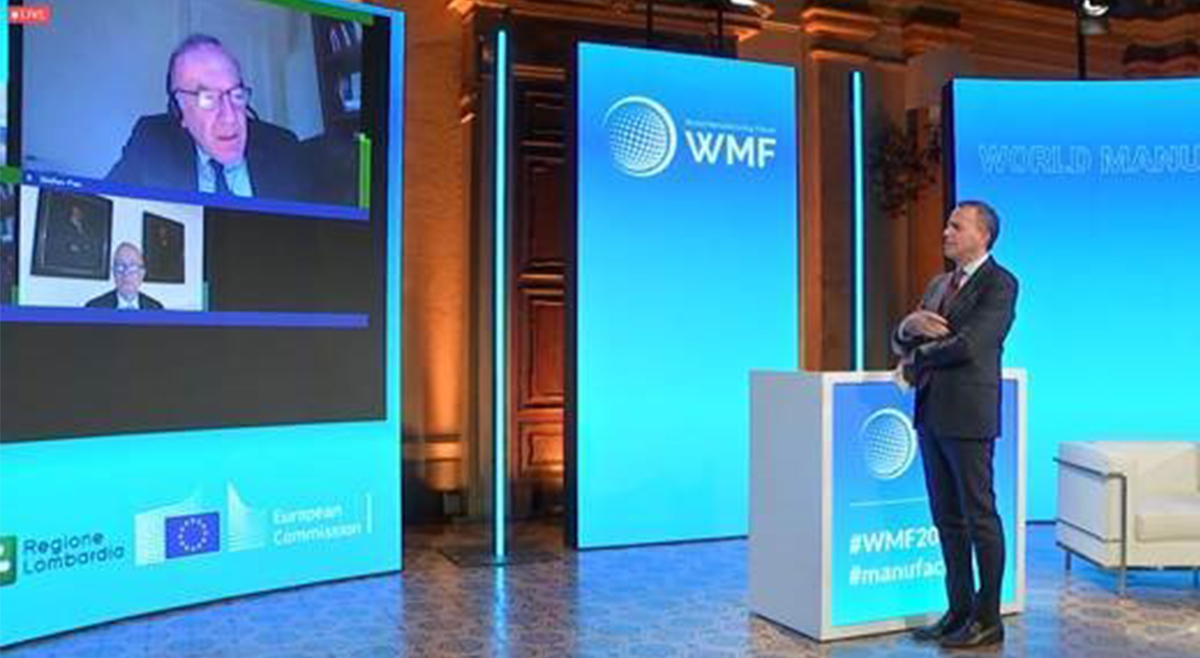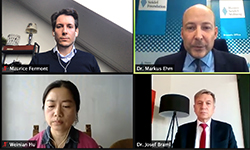BusinessEurope Headlines No. 2020-37
Continue industry support to save our economic recovery!

“Even though the EU economy began its recovery during the summer, our recent Economic Outlook shows that the path back to pre-COVID levels of output is likely to be long and uneven, with uncertainty unusually high and business investment hit particularly hard”, said BusinessEurope President Pierre Gattaz on 11 November at the World Manufacturing Forum 2020. He focused on the role of industrial policy for European competitiveness during the COVID-19 pandemic, in a panel with institutional representatives. President Gattaz stressed that to support the European economy, policy makers should avoid any premature unwinding of support measures to business and workers; rapidly agree and implement the Next Generation EU Recovery instrument; carefully calibrate any changes regarding the regulatory requirements for bank capital in the context of the transposition of the final Basel III agreement; remain committed to delivering an agreement in the EU-UK negotiations; and support European SMEs by making access to funding easier. Asked about the plan of the European Commission to update the EU industrial strategy, Gattaz emphasised the need to take into account the impact of COVID-19 on European companies and on investment capacity. “The updated industrial strategy should underpin the Green Deal with a credible business plan, support digital transformation, restore Single Market freedoms of movement to pre-COVID conditions, and support an ambitious trade agenda and SMEs”, he concluded.
![]() Contact: Daniele Olivieri
Contact: Daniele Olivieri
Our comment
Pact for Skills: what the new European Commission initiative needs to be a success
By Maxime Cerutti, Social Affairs Director
 The ongoing economic transformation, notably towards a greener and more digital Europe, means that company production conditions are evolving rapidly. New technologies are being introduced in the workplace. For example, data processing and management, additive manufacturing, modern transport systems are leading to important changes in what is expected from the human workforce of technicians, professionals, machine operators or drivers.
The ongoing economic transformation, notably towards a greener and more digital Europe, means that company production conditions are evolving rapidly. New technologies are being introduced in the workplace. For example, data processing and management, additive manufacturing, modern transport systems are leading to important changes in what is expected from the human workforce of technicians, professionals, machine operators or drivers.
Human tasks, and the related skills content of many jobs are already changing rapidly. And we expect this trend will accelerate, as Europe will focus on implementing its recovery plan in the coming years. Our recovery actions should in fact focus on the creation of new jobs. Because achieving this job creation will be important for our future prosperity.
With the aim to promote the convergence of forward-looking industrial and skills policies objectives, the European Commission launched last Tuesday its Pact for Skills. The desired synergy of skills for industry is one of the main novelties of the Pact for Skills. This initiative intends to foster public-private partnerships for up and re-skilling Europe’s workforce.
At BusinessEurope, we consider the Pact for Skills as an important EU policy initiative. A key objective for us is to ensure that well-designed new technologies support at the same time employment and productivity gains.
Finding the right way forward presupposes taking into account the diverse realities of industries across our economies. In this respect, it is a complicating factor for policy-makers and social partners that some aspects of skills training are valid cross-industry, whereas others have a strong sectoral characteristic.
For example, progressing in terms of IT skills means to develop the necessary basic IT skills for the whole workforce across sectors. Likewise, client orientation and improved soft skills are essential across sectors whereas emotional intelligence and inter-personal skills are among the competences people have, different to machines, that are highly needed in the labour intensive service sectors, and also in industry in view of the trend towards servitisation.
At the same time, improving skills for innovation will be particularly essential for the industrial sectors. We need to train a sufficient number of people with integrated engineering and advanced IT skills, where the shortages are the highest. The sectoral dimension will also be particularly relevant with respect to the ongoing adaptation of skills to greener production.
To be successful, the Pact for Skills needs to be seen as a means to improve European companies’ and workers’ market position, and their earning capacity, in each sector. This is how the Pact can have positive effects throughout the economy.
But with its proposed charter supporting the Pact’s implementation, a text that is mainly based on the promotion of unilateral commitments from the private sector, the Commission has not put enough emphasis on the role of public investment.
Of course, many companies already invest in their workforce skills. They know this is essential to their success. But in times of Covid, the availability of private investment for skills training cannot be taken for granted when many companies are experiencing an existential struggle for their survival.
The Pact for Skills should not be based on an approach to public-private partnership, which in effect shifts the onus of skills investment to the private sector. The Pact should be conceived as a vehicle to establish new ways of incentivising private skills investment through well-designed financial and non-financial incentives from the public sector.
BusinessEurope stresses the need to take into account the following five building blocks:
- In the short-term, a focus of EU and national investments on e-learning training options is necessary due to limitations for in-person training in a context of social distancing. It is also important to avoid scarring effects for young people who are entering the labour market right now.
- There is a need for a more forceful EU coordination of national reforms of education and training systems. The overarching challenge is to improve and shorten at the national level the process for qualifications updating in view of the changing skills content of the jobs that are available on the market. Some new tools, such as the Online Vacancy Analysis Tool for Europe (“skills-ovate”), developed by the European Centre for the Development of Vocational Training (Cedefop), can be helpful to have better information on changing skills needs. Training provision in future should be underpinned by improved skills intelligence. Data analytics has a lot to offer to that end.
- The Pact for Skills should better recognise the key role played by social partners with respect to employee training. In some countries and/or sectors, social partners are the owners of the biggest training institutions for vocational education and training. It is important that social partners across Europe are given sufficient space and support, at national and sectoral level in particular, to identify the best ways to address the skills needs that companies and workers have.
- The Pact’s implementation should promote the notion that individual workers have a personal responsibility to maintain their employability and choose their career orientation, drawing on the support of improved career guidance tools.
- European employers fully recognise that governments are the main actor responsible for up-skilling the unemployed and inactive people in our societies.
Considering that no dedicated EU resources have been allocated to the implementation of the Pact for Skills, the necessary public investment will need to be mobilised country by country. The Member States are in the middle of their preparations for the national recovery and resilience plans. A key message of the European business community is to encourage the Member States to consider as an important priority, as part of their plans, how best to invest in skills in their country, and to do so involving at an early stage their national social partners.
Contact: Maxime Cerutti
The COVID-19 pandemic will accelerate existing EU-China trends
 “COVID has clarified existing vulnerabilities for European supply chains, prompting companies to prioritise resilience over efficiency”, said Maurice Fermont, Senior Adviser at BusinessEurope, during a webinar hosted by the Hanns Seidel Foundation on 10 November. He pointed out that for policy makers, the pandemic sparked concerns around the ability for Europe to have access to crucial supplies and technologies. This has accelerated trends that were already underway in our bilateral relationship, such as the pursuit of open strategic autonomy. The European Union wants to strengthen its Single Market, offset the distortive effects of China’s state-capitalism, and ensure that we have access to crucial goods and technologies even in times of crisis. “We do not want to decouple from China, but there is an increasing sense of urgency among European businesses that the lack of a level playing field and growing market distortions cannot remain unaddressed”, Fermont said, adding that therefore, the European business community welcomes the fact that the EU is developing new tools to address these problems, while preserving the rules-based multilateral trading system.
“COVID has clarified existing vulnerabilities for European supply chains, prompting companies to prioritise resilience over efficiency”, said Maurice Fermont, Senior Adviser at BusinessEurope, during a webinar hosted by the Hanns Seidel Foundation on 10 November. He pointed out that for policy makers, the pandemic sparked concerns around the ability for Europe to have access to crucial supplies and technologies. This has accelerated trends that were already underway in our bilateral relationship, such as the pursuit of open strategic autonomy. The European Union wants to strengthen its Single Market, offset the distortive effects of China’s state-capitalism, and ensure that we have access to crucial goods and technologies even in times of crisis. “We do not want to decouple from China, but there is an increasing sense of urgency among European businesses that the lack of a level playing field and growing market distortions cannot remain unaddressed”, Fermont said, adding that therefore, the European business community welcomes the fact that the EU is developing new tools to address these problems, while preserving the rules-based multilateral trading system.
Contact: Maurice Fermont
EU social dialogue: focus on meaningful consultations and recovery
 Social dialogue is an important element of the European social model and can be a driving force for successful economic and social reforms. At EU level, it is essential that social partners are consulted in a meaningful way that takes into account the specific role that they have on labour markets relative to other stakeholders. In the short-term, a key priority is to involve the social partners in the implementation of the recovery and resilience facility, focusing on the necessary investments and reforms for long-term growth, job creation and improved skills training. At national level, capacity building support is crucial for social partners in a number of countries. These were the key messages given by Maxime Cerutti, Director of Social Affairs, during a workshop on the future of European social dialogue on 12 November. The event was organised at the initiative of Andrea Nahles, Special Adviser on social dialogue to the European Commissioner for Jobs and Social Rights Nicolas Schmit.
Social dialogue is an important element of the European social model and can be a driving force for successful economic and social reforms. At EU level, it is essential that social partners are consulted in a meaningful way that takes into account the specific role that they have on labour markets relative to other stakeholders. In the short-term, a key priority is to involve the social partners in the implementation of the recovery and resilience facility, focusing on the necessary investments and reforms for long-term growth, job creation and improved skills training. At national level, capacity building support is crucial for social partners in a number of countries. These were the key messages given by Maxime Cerutti, Director of Social Affairs, during a workshop on the future of European social dialogue on 12 November. The event was organised at the initiative of Andrea Nahles, Special Adviser on social dialogue to the European Commissioner for Jobs and Social Rights Nicolas Schmit.
Contact: Robert Plummer
Calendar 
- 16-17 November: 20th European Business Summit
- 24 November: What trade can do for climate - Apero webinar 3/3: Unilateral actions
- 26 November: BusinessEurope Council of Presidents
- 26-27 November: Workshop on the future of vocational education and training (VET)
Not yet a subscriber? Register here.
Reminder: please have a look at our privacy policy